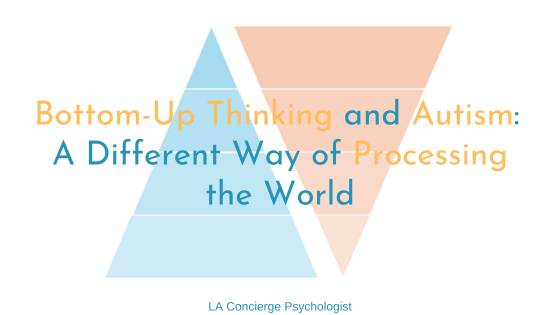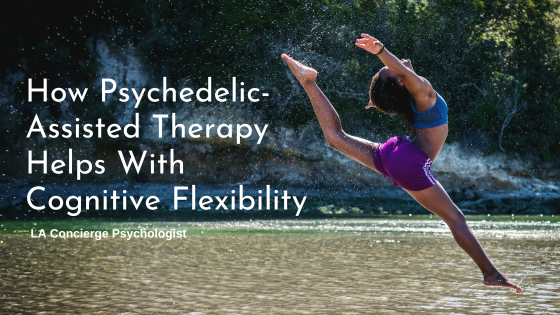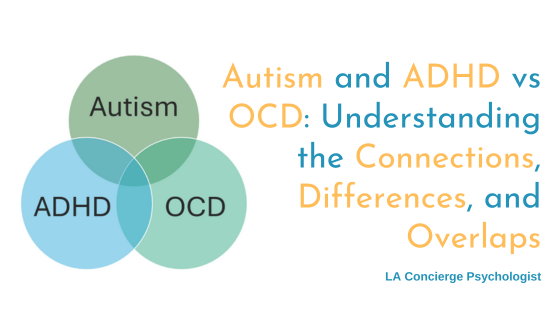Traditional Adult Autism Assessments Can Fail Marginalized Communities. Here’s What I Do Differently.
As an autism specialist in Los Angeles, I’ve found that traditional adult autism assessments don’t always take into account the lived experiences of the people pursuing a diagnosis. Black, indigenous, and people of color (BIPOC individuals), those identified as female at birth, trans and non-binary people, others in the LGBTQIA+ community, or anyone who belongs to a traditionally marginalized community might have their autistic traits missed entirely.
Unfortunately, a lot of our understanding of autism is built upon how it presents in young, white, cisgender boys. For example, the DSM-5[1] conceptualizes autism as a struggle with social communication along with the engagement of “repetitive behaviors” and “restricted interests.” Many clinicians and lay people alike think of Rain Man or Sheldon from Big Bang Theory when they see that. When you don’t fit that mold, many clinicians simply don’t have the proper framework to identify your adult autism. This means countless people struggle without a diagnosis for years, even decades.
The concept of intersectionality is crucial in understanding how autism might manifest differently. Our identities are shaped by race, gender identity, sexual orientation, socioeconomic status, disability, and more. These aspects of our being don’t exist in isolation but merge to create a unique lived experience. For autistic people from marginalized communities, this intersectionality means their neurodivergent characteristics may not fit the stereotypical mold often used in diagnostic criteria. Additionally, the overlapping experiences of systemic oppression and discrimination can influence the presentation of autistic traits.
The Autism Diagnostic Observation Schedule (ADOS), a common diagnostic tool, is a prime example of how this bias can manifest. It relies heavily on observable behaviors and falls short when it comes to how autism can manifest internally, particularly in marginalized groups[2]. In reality, autism presents differently, depending on the person. No autistic person will look exactly like another.
So, What’s the Alternative?
Marginalized communities being overlooked or treated incorrectly is an unfortunate reality of the medical and mental health system. However, there are ways to make adult autism assessments more inclusive of everyone’s experiences. After working with autistic people for over 20 years, this is a topic I’m passionate about. So, I’ve taken steps to adapt my adult autism assessments in LA to better identify non-stereotypical presentations of autism, which are more common in people of marginalized communities.
A Deeper, More Personal Approach
My therapeutic and conversational assessment process focuses on unpacking and understanding your internalized experience rather than solely relying on what’s observed externally. There are many reasons why this is better at diagnosing adult autism. One reason being that many autistic people have learned to mask many of these observable traits. This is particularly true for women and those from marginalized communities. They often express their autism in less stereotypical ways due to heightened pressure to conform. For example, an autistic person of color may feel the need to mask even more intensely to avoid being perceived as doubly “different.” This masking can make their autism invisible, leading to misdiagnosis, missed diagnosis, or significantly delayed diagnosis
Instead of feeling observed under a microscope, I’ll take time to understand your experience with deep conversation, curiosity, and understanding of your experience. A typical interview included in an autism assessment in California can take just on session that lasts 1-1.5 hours. Whereas, my adult autism assessment will spend 4 to 6 weekly interview sessions exploring and reflecting on your lived experiences. You will develop your own realizations as the weeks go on, without feeling rushed and with insights from me, given when appropriate. My goal is for you to leave with a genuine understanding of yourself that you can use as a basis for future learning and growth.
This is a far cry from traditional neuropsych adult autism assessments, where many people feel like a blank wall is evaluating them. Instead, you will spend time with an actual person who interacts with you and validates and normalizes your experiences. The feedback you will receive from your assessment is focused on understanding how I came to my diagnostic conclusions. There will be plenty of time for questions and processing the new information at the end so that you can feel confident about your results.
Autism Assessments that are Tailored to Your Needs as a Neurodivergent Adult
My process is structured in a neurodivergent-affirming and friendly way, starting with simple and clear intake paperwork. Paperwork can be a huge barrier to neurodivergent people getting the support they need, whether that’s because it’s too complex or simply overwhelming.
Before we start the assessment process, you will receive lots of details about how my waitlist for autism assessment in LA works (if there is one). You will also get a thorough description of how the assessment process is carried out before the first session. So you can feel prepared for each assessment session, you will learn about each week’s topics and potential questions ahead of time so there are no surprises. This way, you can be fully prepared for each session and won’t have to anticipate what it will be like. Additionally, each session will always be carried out with a familiar rhythm, so you can know what to expect.
My adult autism assessments in California are always a safe and encouraging space with the freedom to be authentic. Though it can be difficult to unmask, there’s no pressure to make eye contact, and you’re encouraged to move your body as feels comfortable and express yourself as bluntly as you want. Questions and curiosities are always invited during sessions. I don’t take offense to neurodivergent ways of communication.
I will engage with you as a human being and will always welcome and encourage feedback without defensiveness. Modifying the process to make it as comfortable as possible for you is prioritized.
Affordable Adult Autism Assessments in California for Marginalized Communities
Traditional neuropsychological adult autism assessments in Los Angeles are often in the $5,000 to $10,000. This usually includes an intake/interview appointment, one to two testing sessions, a feedback session, and a written report. The majority of the cost of the assessment is for work the psychologist or neuropsychologist does independently, not time spent working directly with you. This includes tasks such as scoring assessment measures and writing the report.
Traditional neuropsych assessments can be cost-prohibitive, especially for those who are LGBTQIA+[3], women, and other marginalized communities who overall earn lower salaries[4].
Access to diagnosis shouldn’t be a privilege. But, the reality is that it’s beyond the means of many people who need it. To combat this, I offer a significantly more affordable adult autism assessment in the $1,500-$2,250 range. The cost is made more affordable by limiting the assessment process to collaborative sessions and some brief time outside of sessions where I reflect on the data I’ve collected during our time together. Additionally, almost the full cost of the assessment is for time I spend directly working with you. Time spent building a deep understanding of who you are.
Because there is no written report provided at the end of the process, you’re able to save thousands of dollars on your adult autism assessment in LA but still get your diagnosis.
It’s Not Just Autism — Co-occurring Conditions Can Mask Autistic Traits in Adults
Autistic people experience a much higher likelihood of experiencing co-occurring conditions. Studies have shown as many as 74%[5] had at least one existing comorbidity. These include diagnoses such as ADHD, C-PTSD, anxiety, or depression. Because these can overlap and even mask autistic traits, many people’s autism can be misdiagnosed and missed altogether. This is particularly true for assessments for those identified female at birth. They are more likely to be misdiagnosed with conditions like anxiety, depression, or borderline personality disorder.[6] As part of my adult autism assessment in California, I consider co-occurring conditions (ruling them in or out). It’s my priority to get the full picture of your experience.
Why Get an Adult Autism Diagnosis At All?
It’s not uncommon for people, especially adults, to question the value of an autism assessment. You’ve managed this long, so why now? However, from my experiences working with autistic adults in California who get assessed later in life, I can say that a diagnosis can be life-changing.
Firstly, a diagnosis opens doors to specialized support tailored to your needs. Traditional therapies don’t always resonate with autistic individuals, and an autism specialist can provide a more understanding and effective approach.
Additionally, knowing your neurotype can provide a powerful sense of self-understanding and empathy. Many autistic adults describe a feeling of clarity and self-compassion after diagnosis – their life experiences finally make sense. Instead of feeling like a “broken” neurotypical person, they feel like a “as I’m supposed to be” autistic person.
Moreover, knowing you’re autistic helps you connect with a like-minded community. This fosters a sense of belonging and eases the social difficulties often felt when interacting with non-autistic people. Even though the autistic community fully embraces self-identification, some people don’t feel comfortable entering autistic spaces. They first want 100% confidence that they’re autistic and belong.
Ready for a Different Kind of Adult Autism Assessment in California?
If you’ve felt unseen or unheard by traditional adult autism assessments in California or have been apprehensive about the process, my approach could be right for you. No matter how confusing things seem right now, I have the knowledge, expertise, and compassion to help you find clarity regarding an adult autism diagnosis in LA. As an adult autism specialist, I will take your complex set of struggles and help you make sense of them.
Email Dr. Lee to be placed on my waitlist. Or, if you’d like more details about the process, check out the adult autism assessment service page before reaching out to schedule.
[1] DSM -5
[2] Analysis of Race and Sex Bias in the ADOS-2 Kalb (Et al) 2022
[3] The Wage Gap Among LGBTQ+ Workers in the United States
[4] The Crisis of Low Wages in the US
[5] Khachadourian (Et al) 2023
[6] Missed Diagnoses and Misdiagnoses of Adults with ASD — Fusar-poli (Et al)



